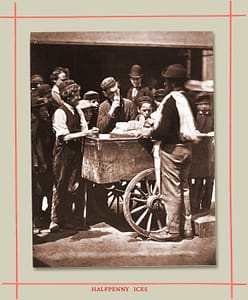
ITALIAN ice-men constitute a distinct feature of London life, which, however, is generally ignored by the publIc at large, so far as its intimate details are concerned. We note in various quarters the ice-barrow surrounded by groups of eager and greedy children, but fail to realIze what a vast and elaborate organization is necessary to provide this delicacy in all parts of London. Most persons are aware that there is an Italian colony at Saffron Hill, but It is strange how few visitors ever penetrate this curious quarter. The Italians have certainly succeeded in keeping themselves apart from the rest of the population. Whole courts and alleys are entirely inhabited by these foreigners; there is not a single English person among them, and the tradesmen of the neighbourhood are also for the most part Italians. From this centre the men radiate to all parts of London and the suburbs, many preferring to walk ten and twenty miles per day, to living nearer their ” pitch,” but further away from their countrymen. It is true they enjoy certain facilities at Saffron Hill, which could not be obtained readily elsewhere. The tradesmen of that locality supply all the paraphernalia necessary to the business of their customers. There also the milk is kept and sold on special terms for the mixing of ices. In little villainous-looking and dirty shops an enormous business is transacted in the sale of milk for the manufacture of halfpenny ices. This trade commences at about four in the morning. The men in varied and extraordinary déshabille pour into the streets, throng the milk-shops, drag their barrows out, and begin to mix and freeze the ices. Carlo Gatti has an ice depot close at hand, which opens at four in the morning, and here a motley crowd congregates with baskets, pieces of cloth, flannel, and various other contrivances for carrying away their daily supply of ice. Gradually the freezing process is terminated, and then the men, after dressing themselves in a comparatively-speaking decent manner, start off, one by one, to their respective destinations; It is a veritable exodus. The quarter, at first so noisy and full of bustle, is soon deserted, a few women only remaining to attend to the domestic affairs and to quarrel with their loquacious neighbours.
Towards evening, about seven o’clock, the ice-men begin to return. From all points of the compass they approach Saffron Hill. At first there are only one or two to be seen, then, as night draws near, the numbers increase, till their barrows jostle together, and they can hardly pass along. The greatest celerity is, however, displayed in unloading and packing these barrows close up one upon the other, against the walls of courts and yards used for this purpose; each man anxiously looking forward to the few hours of recreation which precede bedtime. Groups of loiterers then begin to form, some singing, some engrossed with the game of mora; but one and all finding amusement of a sober, though of a noisy description. In this sense the Italian colony sets us an admirable example. Drunkenness is an unknown vice. Yet some of these men are known to be the worst characters that Italy produces. As a rule, they almost invariably style themselves Neapolitans, and in answer to questions will say that they come from Naples itself. The probabilities are, however, that they have never even seen Naples, and a true Neapolitan would energetically repudiate any connexion with the tribe. As a matter of fact, a very large number of the street ice-sellers are Calabrians, and are, therefore, semi-barbarous mountaineers. Some have undoubtedly been brigands in their time, and in that capacity sympathized with King Bomba, and fought for his very Catholic Majesty Francis II, the Bourbon King of Naples. In England, however, they become for the time being, at least, honest. They can make more in selling ices in our thoroughfares than in cutting throats round and about Naples, and this, too, with much greater security to themselves.
Nevertheless, and however questionable his antecedents may be, the Italian ice- man sets an example of steady perseverance, economy, and foresight which is at once the envy and the marvel of the English poor who live around. The latter maintain that the Italian ” lives on nothing ;” the fact being that he does not waste his money over extravagant food, and has discovered that he can grow fat and strong on farinaceous substances as well as on meat. Hence a cabbage, a little lard, or the fat of bacon, and some maccaroni as the foundation of his dinner, will suffice to render him strong and happy. By means of this frugality he is able to economize sums of money that appear perfectly fabulous to his English neighbours. I met, and this was a rare exception, an English woman selling ices; and on my congratulating her for attempting a business which seemed so advantageous, she said it was indeed a pity to see English persons starving, “while foreigners were able to bank the money they picked up in our streets.” Effectively the Italians do bank the money they earn, and what is more contrive to save sufficient to indulge in a luxury which but few English middle-class families can afford–– they winter in Italy! Indeed, they not only seek a more propitious sky for the winter months, but they further enjoy sport in which only the wealthy are allowed to participate on this side of the Channel. They spend the winter shooting, and some of the ice-sellers have been known to buy excellent fowling- pieces in England to take back with them to their native villages. Ultimately, they nearly all become landed proprietors. The savings, accumulated during many years, enable them to buy a cottage and a small plot of land, with the right of shooting over the neighbouring woods or mountains, and here they pass a peaceful old age. Sobriety and constant physical out-door exercise endow them with robust constitutions, and they are thus able to look forward with some degree of confidence to a prolonged existence. The idea, therefore, of working and stinting for ten or twenty years does not appal them. Year after year they resume their task, and those who have been less fortunate, and cannot afford to return to Italy for the winter, find some sort of employment in England, many being engaged to lay the asphalte in the streets of London, or of provincial towns.
As such numerous advantages accrue to these men it is natural to inquire what is their income. Of course the ices sold give a large profit, but it is from the coloured and water ices that the largest benefits are derived. The colour, it is true, is an absolute snare and delusion. It generally consists of cochineal, and has no connexion whatever with the raspberries or strawberries which it is supposed to represent. There really is nothing in these ices but sugar, to which the cochineal adds a certain roughness that produces a titillation on the tongue, fondly believed by the street urchins to be due to raspberries. This ice is altogether, therefore, a very questionable article, and the less consumed the better the consumer will find himself. The lemon ices are equally inexpensive, consisting but of sugar and water, flavoured.with a lemon, or with some essence of lemon. This is a safer delicacy, and, in fact, if the essence may be relied upon, and the water clean, cannot do any harm, while at the same time its sale must yield abundant returns. It is of this ice and of the coloured ice that gratuitous mouthfuls are sometimes given to street boys, to excite the appetite bystanders and invite custom.
The real Ice, however, for which there is a universal demand, is that known under the generic term of cream ice. But milk is indispensable to its manufacture, and indeed eggs should also be used. This necessity altogether destroys the golden dreams suggested by the water ices, and great are the efforts made to sell the latter, or at least to mix a goodly proportion with the expensive cream delicacy. Nevertheless, the profits on selling cream ices must amount to nearly a hundred per cent, so that after all the Italians are not so much to be pitied because their customers display inconsiderate pertinacity in their demand for that form of ice which is not only the most agreeable to the palate, but the most wholesome and nutritious. Taking all in all, the ice-sellers must realize a net profit varying from . £1 to £2 per week, according to the locality in which the ices are sold, and the state of the temperature. At the same time, no men are more chary of giving any clue as to the money they possess. They generally deem it more prudent to profess extreme poverty, and often carry two purses. The one is secreted in some inner fold or secret pocket, and is only opened in private. This contains gold, which periodically is either deposited in a bank, or sent over to relations in Italy. The other purse rarely holds anything more valuable than penny pieces, and is consequently shown more freely. An ice-seller will not often be seen holding his purse out in his hands; but he may, on the contrary, often be noticed ducking his head under the table, and opening his purse between his knees, so that no one can see what he possesses.
The fear and suspicion thus displayed is one of the symptoms which denote the semi-barbarous nature of these Calabrians. But the crude superstitions hich trouble them are the clearest proof of barbarity. They are fanatics of the most ignorant type. They will bow down in abject fear, and tremble before any image or relic, though they know nothing of real religion, and still less of theology, whether Catholic or Protestant, but simply look upon the priest as an awful, mysterious man whom they superstitiously believe capable of inflicting upon them untold tortures. The better educated and skilful Italian artisans, who make chalk statuettes, or looking-glasses, or are engaged in other artistic occupations, express the profoundest contempt for their fellow-countrymen who sell ices in the streets. Some even go so far as to pretend that, ethnological1y, they are of a different race, an argument not devoid of foundation. In any case they are bitter against the ignorance which seems to be the worst fault of the class. Despite these objections, I could not help feeling sympathy for men who are, notwithstanding their ignorance, so persevering and sober. That so many of them should succeed in earning a respectable position by becoming peasant proprietors, when English workmen, with far greater advantages, so often end their days in the workhouse, is a fact which in itself calls for commendation. The ice-sellers are doubtless stingy, and even mean; they are dirty, and at times objectionably subservient; but, nevertheless, the example of their lives is useful in a country where the poorer classes have no notion of economy, are guilty of continuous daily waste, and are ever betraying their interests and selling their substance for the sake of drink. It seems strange that so many hundred foreigners should come over from the far south of Italy to make and sell ices in our streets, when innumerable English men and women are without employment, and could easily practise the same trade; but the pence of the poor which have enriched these Calabrians have not been wasted, if.the example given by the latter has spread to some of their English customers, teaching them the value of thrift and sobriety.
A . S.
